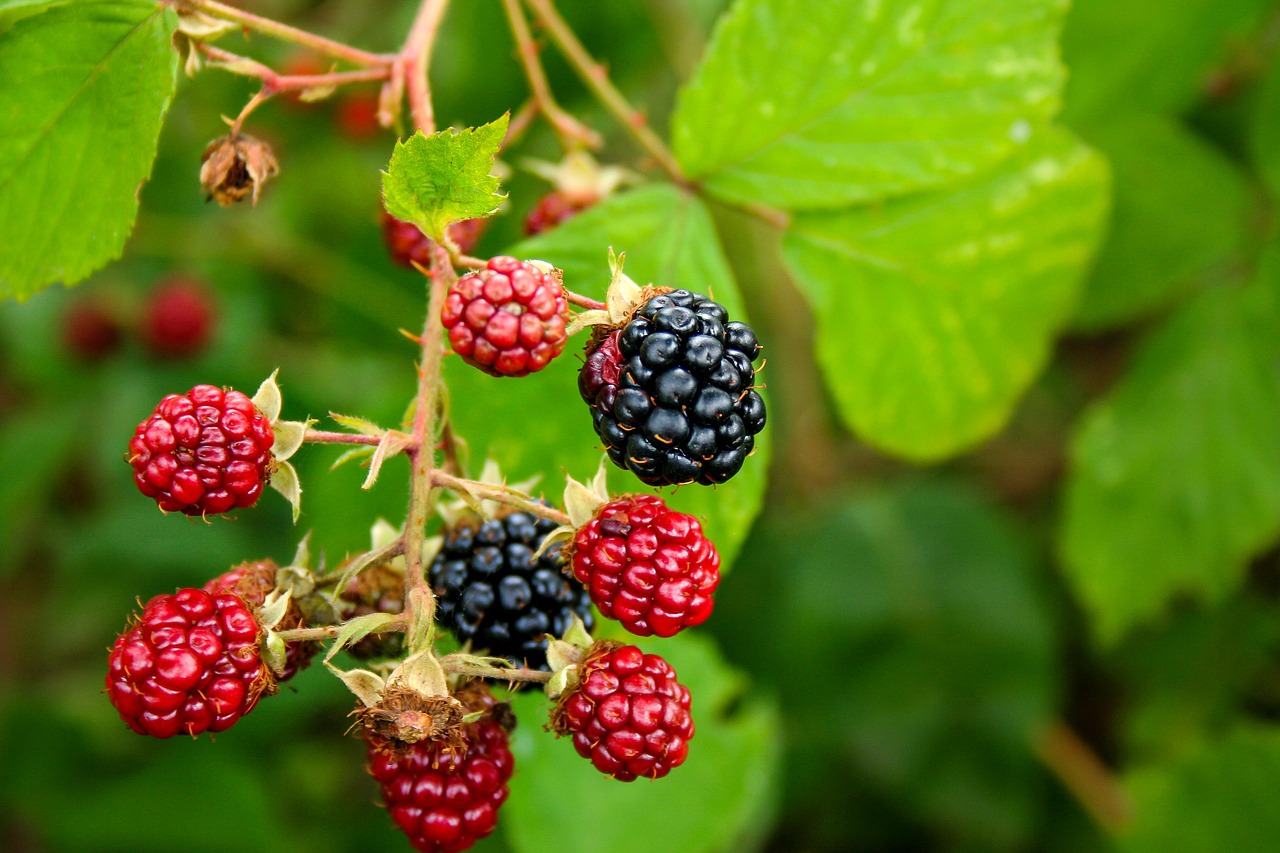I. Getting Started with Companion Planting for Blackberries
Welcome to the world of companion planting, a gardening technique that harnesses the power of symbiotic relationships between plants to create healthier, more productive gardens.
If you’re a blackberry enthusiast or a gardener looking to maximize the potential of your berry patch, companion planting is a practice you’ll want to explore.
1. Introducing Companion Planting
Companion planting is a time-honored gardening tradition that involves strategically planting different species of plants near each other to benefit one another.
These plants can either enhance each other’s growth, deter pests, or provide other ecological advantages. It’s like creating a harmonious ecosystem right in your garden, where plants work together to thrive.
2. The Significance of Companions in Blackberry Cultivation
Why should you consider companion planting for your blackberry bushes? The answer lies in the numerous benefits it offers:
- Improved Soil Health: Certain companion plants can enhance soil fertility by fixing nitrogen or increasing organic matter, providing the ideal conditions for blackberry growth.
- Pest Management: Companion plants can help deter common pests that may plague your blackberries. By strategically choosing companions, you can reduce the need for chemical pesticides.
- Pollination and Fruit Set: Some companion plants attract pollinators, such as bees and butterflies, which are crucial for ensuring a bountiful blackberry harvest.
3. What This Blog Will Cover
In this comprehensive guide, we’ll delve deep into the world of companion planting for blackberries.
We’ll explore the benefits of this practice and help you select the right companion plants to support your blackberry patch.
We’ll also provide practical tips on planting, caring for your garden, and managing pests and diseases naturally.
So, whether you’re a seasoned gardener looking to improve your blackberry yields or a beginner eager to start your gardening journey on the right foot, read on to discover the secrets of growing blackberries with companions.
Let’s dive into the wonderful world of companion planting and unlock the full potential of your garden.
II. The Benefits of Companion Planting for Blackberries
Companion planting is not just a gardening fad; it’s a strategic approach that offers a wide array of benefits, especially when it comes to nurturing healthy and productive blackberry gardens.
1. Enhancing Soil Health and Fertility
One of the foremost benefits of companion planting for blackberries lies in its ability to improve soil health and fertility. Here’s how it works:
- Nitrogen Fixation: Some companion plants, like legumes (e.g., clover or beans), have the remarkable ability to fix nitrogen from the atmosphere into the soil. This added nitrogen boosts soil fertility, providing blackberries with the essential nutrients they need to thrive.
- Organic Matter: Other companion plants, such as cover crops like oats or rye, contribute organic matter to the soil as they decompose. This organic matter improves soil structure, water retention, and nutrient availability.
2. Natural Pest Management
Say goodbye to the constant battle against garden pests. Companion planting can be an effective form of natural pest management:
- Companion Plants as Pest Deterrents: Certain companion plants emit scents or compounds that repel common blackberry pests like aphids, Japanese beetles, or spider mites. By strategically placing these companions, you can create a barrier against potential infestations.
- Beneficial Insects: Companion plants like marigolds or yarrow attract beneficial insects such as ladybugs, lacewings, and parasitic wasps. These insect allies can help keep harmful pests in check.
3. Attracting Beneficial Insects
In addition to pest deterrence, companion plants have the remarkable ability to lure beneficial insects into your garden:
- Pollinator Magnets: Flowers like bee balm, coneflowers, and lavender are irresistible to pollinators like bees and butterflies. A thriving population of these insects is essential for successful blackberry pollination and fruit set.
4. A Balanced Ecosystem
Companion planting fosters a balanced and biodiverse garden ecosystem where plants interact synergistically, creating a harmonious environment that supports healthy blackberry growth.
III. Selecting the Right Companions for Blackberries
Now that we’ve explored the myriad benefits of companion planting for your blackberry garden, it’s time to roll up our sleeves and get into the nitty-gritty of choosing the perfect companions.
1. Common Companion Plants for Blackberries
Let’s start by introducing you to some tried-and-true companion plants that have proven to be excellent allies for blackberries:
- Clover (Trifolium spp.): Clover is a nitrogen-fixing plant that improves soil fertility. It also acts as a living mulch, helping to suppress weeds around blackberry bushes. Its low-growing habit makes it an excellent ground cover.
- Borage (Borago officinalis): Borage is known for its vibrant blue flowers that attract pollinators like bees. It also has cucumber-scented leaves that can deter tomato hornworms and cabbage worms, making it a valuable companion for blackberries.
- Marigolds (Tagetes spp.): Marigolds are not only beautiful with their bright blooms but also effective at deterring aphids, nematodes, and other garden pests. They release compounds that repel these harmful insects.
- Comfrey (Symphytum officinale): Comfrey has deep roots that mine nutrients from the soil and make them available to nearby plants. It’s often used as a nutrient-rich mulch, and when its leaves are cut and used as mulch, they can benefit blackberry bushes.
- Lavender (Lavandula spp.): Lavender’s fragrant blooms are highly attractive to bees and butterflies, making it an excellent choice for boosting pollination in your blackberry patch. It also has a reputation for repelling moths and flies.
- Nasturtium (Tropaeolum spp.): Nasturtiums are not only visually appealing with their colorful flowers but also useful as trap crops. They can attract aphids away from your blackberries, acting as sacrificial plants.
- Chives (Allium schoenoprasum): Chives are members of the onion family and are known for their strong scent. Planting chives near your blackberries can help deter aphids and other pests that dislike the smell of onions and garlic.
These common companion plants can enhance the health and productivity of your blackberry garden while adding beauty and biodiversity to your landscape.
When strategically planted, they create a more harmonious and sustainable ecosystem in your garden.
2. Criteria for Selecting Companion Plants
Choosing the right companions requires careful consideration. Here are some key criteria to keep in mind:
- Compatibility: Ensure that companion plants are compatible with blackberries in terms of soil, sunlight, and moisture requirements. Ideally, they should have similar growing conditions.
- Growth Habits: Consider the growth habits and potential size of both the blackberries and their companions. You don’t want one overshadowing or crowding out the other.
- Pest and Disease Compatibility: Select companion plants that complement blackberries by deterring pests or repelling diseases that commonly affect them.
3. Tailoring Companion Plants to Your Garden Goals
The beauty of companion planting is its adaptability to your specific gardening goals. Here are some tailored suggestions:
- Pest Control: If your primary concern is pest control, consider planting strong-smelling herbs like basil, rosemary, or oregano near your blackberries. These herbs can confuse and repel pests effectively.
- Pollination: To boost pollination and fruit set, integrate a variety of nectar-rich flowers like cosmos, sunflowers, and zinnias into your garden.
- Soil Improvement: If soil health is your priority, plant nitrogen-fixing legumes like clover or vetch, or deep-rooted comfrey to enhance soil fertility.
By selecting the right companions based on your garden’s specific needs and conditions, you can create a thriving ecosystem that not only supports your blackberry bushes but also enhances the overall health and productivity of your garden.



